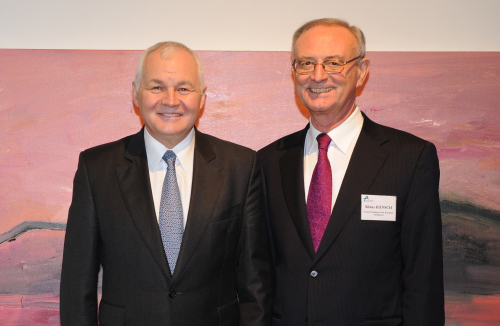Poland, Germany share how they moved from foes to friends
By Korea HeraldPublished : Dec. 4, 2011 - 19:42
Polish and German former politicians have visited Seoul to tell how “vanquishing prejudices” moved their countries from conflict to friendship, and ask whether Korea and Japan can learn from their experience.
Both Polish-German and Korean-Japanese relations have been marred by long histories of conflict, culminating in the Second World War.
While the two European nations are celebrating the twentieth anniversary of their Treaty of Good Neighborhood and Friendly Cooperation this year, Korea-Japan ties remain frayed by Japan’s territorial claims over the Dokdo Islets as well as its history textbooks downplaying its brutal colonial rule of Korea.
But finding acceptable interpretations of past events is vital to reuniting nations after conflict, former European Parliament President Klaus Hansch said following the conference organized by the German and Polish embassies here.
“That is a big issue, and has been one of the sources of German-Polish reconciliation. Both sides had to look at their history and in particular their school books,” the German representative to the EU said.
“It is important to look not for a totally common interpretation but one giving room for the interpretation of the other side.
Both Polish-German and Korean-Japanese relations have been marred by long histories of conflict, culminating in the Second World War.
While the two European nations are celebrating the twentieth anniversary of their Treaty of Good Neighborhood and Friendly Cooperation this year, Korea-Japan ties remain frayed by Japan’s territorial claims over the Dokdo Islets as well as its history textbooks downplaying its brutal colonial rule of Korea.
But finding acceptable interpretations of past events is vital to reuniting nations after conflict, former European Parliament President Klaus Hansch said following the conference organized by the German and Polish embassies here.
“That is a big issue, and has been one of the sources of German-Polish reconciliation. Both sides had to look at their history and in particular their school books,” the German representative to the EU said.
“It is important to look not for a totally common interpretation but one giving room for the interpretation of the other side.

“I think that is very important because this is how the younger generation is instructed. School books can do a lot of good and they can do a lot of bad in the understanding between countries.
“If there is a will to do it, from the perspective of reconciliation it is absolutely necessary to have such a common view of what we have, or what Koreans and Japanese have, in school books.”
Former Polish Prime Minister Jan Krzysztof Bielecki was hopeful that Korea and Japan could improve relations as his country and Germany had done. He said the EU member states had become “good neighbors” in the years following the collapse of the Soviet Union in 1991, which had previously controlled Poland and divided Germany.
“Just two decades after German unification the overwhelming majority of Poles no longer fear their western neighbors,” he said, adding that only 14 percent of Poles still feel anxiety associated with Germany, while 88 percent said they feared Germans in 1990.
“The (Korean-Japanese) relationship is comparable to the relationship in the early 80s, which gives me optimism for the case regarding reconciliation that it could happen in ten years following the reunification of Korea,” Bielecki added.
Asked about continuing troubles between Korea and his country, Kanehara Nobukatsu, minister of the Japanese embassy here, told attendees: “The nations are making efforts to establish good relations. I believe if we respect each other and try hard we can overcome these issues.”
He called territorial disputes between Korea and Japan over islands “a big stress” to the two countries’ ties, adding: “This is a very emotional issue, but I think that we can further our relationship.”
A recent survey found that 60.5 percent of Koreans felt that Dokdo was the biggest obstacle to the development of Korean-Japanese relations. The issue of Japanese textbooks most greatly concerned 32 percent of respondents to the survey carried out by the Asan Institute for Policy Studies, which hosted the Dec. 1 forum. The remaining 7.5 percent of Koreans surveyed thought that the biggest barrier was Japan’s refusal to give a proper apology or compensation for Korean “comfort women” forced into sexual slavery during World War II.
“Reconciliation and to struggle for mutual understanding is difficult,” Hansch told the conference. “Our history since 1945 has shown it. To overcome historical divisions is even more difficult, but most difficult is to vanquish our prejudices.”
By Kirsty Taylor (kirstyt@heraldcorp.com)
-
Articles by Korea Herald








![[KH Explains] How should Korea adjust its trade defenses against Chinese EVs?](http://res.heraldm.com/phpwas/restmb_idxmake.php?idx=644&simg=/content/image/2024/04/15/20240415050562_0.jpg&u=20240415144419)











![[Today’s K-pop] Stray Kids to return soon: report](http://res.heraldm.com/phpwas/restmb_idxmake.php?idx=642&simg=/content/image/2024/04/16/20240416050713_0.jpg&u=)